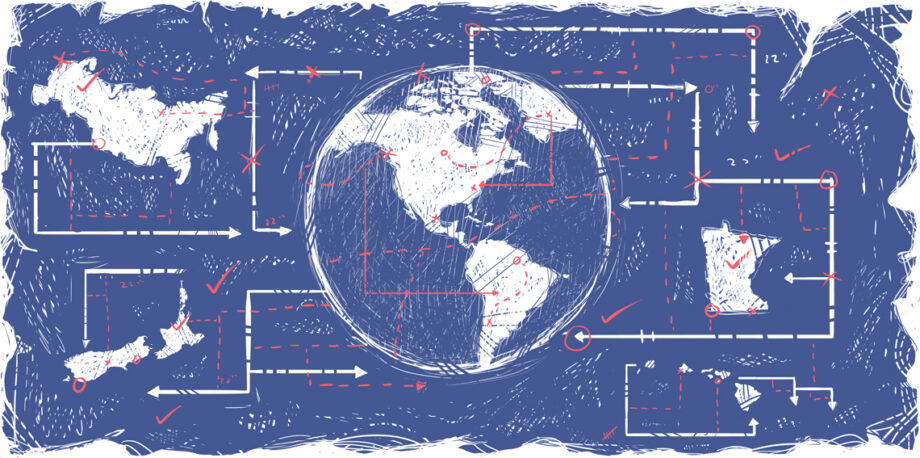January 28, 2013 — Let’s face it: Too many of our systems are broken, and we seem unable to fix them.
Whether the issue is tackling climate change, building enduring food and water security, eliminating deforestation, or preserving the world’s remaining biodiversity, the environmental challenges we face as a society seem to be getting worse. And, unfortunately, our current political and economic systems seem utterly incapable of addressing them.
Even more troubling, we seem interminably stuck, going around in circles, getting nowhere closer to a real solution. We fiddle and the planet burns.
I think we’ve gotten stuck because we expect old solutions are going to solve our new problems. We try the same things, again and again, and they just don’t seem to work. So we try them again, hoping that this time they will. But we should all remember the old definition of insanity: doing the same thing over and over, expecting a different result.
But it doesn’t need to be this way. Instead of repeatedly playing, and losing, the same old game, maybe it’s time to change the rules. Maybe it’s time to try some new approaches to solve our greatest environment problems.
I’m convinced that many of those solutions are staring us in the face right now; we just have to look for them.
For example, we can see perfectly functioning, amazingly complex, truly sustainable systems operating in nature every day. In fact, the rest of the planet works perfectly well with zero waste, running at ambient temperatures, driven purely by renewable energy from the sun. Life is a system that takes inert matter, and with a few photons and hydrogen bonds, creates marvelous replicating patterns that have been evolving on this planet for billions of years.
Let’s admit it: Nature is a hell of a better engineer than we are. It works because it knows how to close the Earth’s material loops, without depleting key resources or creating untenable pollution, and shapes the most magnificent systems in the universe. Nature also knows how to use easily available, renewable forms of energy, from the sun or from other organisms, to power the workings of the entire biosphere. Maybe there’s a lesson or two for us here?
In recent stories we’ve introduced some of the world’s most creative environmental thinkers, and explored some of the world’s leading innovations in environmental solutions, from improving urban infrastructure to saving endangered species. A common thread in these stories is one of reinvention: looking at an old problem and reimagining it with new approaches to find a new solution.
Here at the Institute on the Environment, we’re also in the process of reinvention. Momentum has become Ensia, a new print and online magazine and event series that’s out to change the world. Reaching across sectors, disciplines, political persuasions and continents, Ensia will provide people who have the power to shape new solutions to environmental grand challenges with the innovative ideas, information and inspiration they need to do so.
Made possible in large part by a generous grant from the Gordon and Betty Moore Foundation, Ensia will still offer the quality reporting and exceptionally designed magazine you have told us you appreciate and value. Extending far beyond the limits of conventional magazines, Ensia online will provide daily updates that include fresh looks at well-known challenges, solution-focused alerts to emerging issues, new perspectives from leading thinkers around the world and much more. And over the course of the next two years, Ensia Live will evolve into a world-class event that provides the spark we need to ignite solution-focused action around key global issues.
We welcome you as one of the inaugural members of the Ensia community, and we encourage you to share this remarkable resource with others. Working together, we can escape the “over and over” rut and begin, finally, to traverse the path of truly transformative change.
Editor’s note: The views expressed here are those of the author and not necessarily of Ensia. We present them to further discussion around important topics. We encourage you to respond with a comment below, following our commenting guidelines, which can be found here. In addition, you might consider submitting a Voices piece of your own. See Ensia’s “Contact” page for submission guidelines.
Ensia shares solutions-focused stories free of charge through our online magazine and partner media. That means audiences around the world have ready access to stories that can — and do — help them shape a better future. If you value our work, please show your support today.
Yes, I'll support Ensia!

As a scientist I believe in science, the problem is what science the current environmental-climate crisis we will need.
That is the only way I envision to fix all the broken systems that allow us to be here, on Earth.
Sustainability is for things like cars, airplanes, smart phones, and running shoes. Regeneration is for all the things that make life and evolution possible.